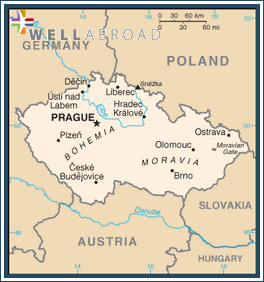|
MOST RECENT ALERTS
There's no recent alert.
|

|
|||||||||||||||
| COUNTRY OVERVIEW | ||||||||||||||||
|---|---|---|---|---|---|---|---|---|---|---|---|---|---|---|---|---|
|
| COUNTRY GENERAL INFORMATION | |||||||
|---|---|---|---|---|---|---|---|
| Language: |
Czech |
||||||
| Currency: | Czech Koruna (CZK) | ||||||
| Predominant Religions: |
Roman Catholic 26.8%, Protestant 2.1%, other 3.3%, unspecified 8.8%, unaffiliated 59% |
||||||
| National Holidays: | Czech Founding Day, 28 October (1918) | ||||||
| Economic Status: |
The Czech Republic is one of the most stable and prosperous of the post-Communist states of Central and Eastern Europe. |
||||||
| Security: |
Army of the Czech Republic (ACR): Joint Forces Command (includes air forces), Support and Training Forces Command |
||||||
| US Presence: |
U.S. Embassy in Prague
Tržišt? 15 118 01 Praha 1 – Malá Strana Czech Republic Switchboard: (+420) 257 022 000 |
||||||
| Document Requirements: |
The Czech Republic is a party to the Schengen Agreement. As such, U.S. citizens may enter the Czech Republic for up to 90 days for tourist or business purposes without a visa. The passport should be valid for at least three months beyond the periods of stay. For further details on travel into and within Schengen counties, please see our Schengen Fact Sheet. All foreigners seeking entry in the Czech Republic must carry proof of a medical insurance policy contracted for payment of all costs for hospitalization and medical treatment in the Czech Republic. Visas are required for U.S. citizens for longer stays and in order to work in the Czech Republic. In such cases, it is recommended that travelers obtain a visa in advance of going to the Czech Republic. The Embassy of the Czech Republic’s web site provides the most current visa information. The Czech Government requires travelers to the Czech Republic to have proof of finances to pay for their stay and proof of travel/health insurance. Minimum coverage of the insurance has to be at least $35,000. According to the Czech Government, a health insurance card or an internationally recognized credit card with health insurance included will generally be accepted as proof of insurance to enter the country. The health insurance requirement does not apply to those who have visas permitting them to work. Note: Although European Union regulations require that non-EU visitors obtain a stamp in their passports upon initial entry to a Schengen country, many borders are not staffed with officers carrying out this function. If an American citizen wishes to ensure that his or her entry is properly documented, it may be necessary to request a stamp at an official point of entry. Under local law, travelers without a stamp in their passports may be questioned and asked to document the length of their stay in Schengen countries at the time of departure or at any other point during their visit, and could face possible fines or other repercussions if unable to do so. Information about dual nationality or the prevention of international child abduction can be found on our web site. For further information about customs regulations, please read our Customs Information sheet. |
||||||
| Major Airports: |
Airports: 121, Airports w/paved runways: 46 |
||||||
| Servicing Airlines: |
|
||||||
| Risks and Precautions: |
Civil disorder is rare in the Czech Republic, although strikes and demonstrations may occur. Americans are advised to avoid street demonstrations. |
||||||
| Mortality Statistics: |
Infant MR total: 3.89 deaths/1,000 live births |
||||||
| Immunization Indicators: |
Required: None |
||||||
| Infectious Disease Concerns: |
People traveling from April-October who plan to participate in camping or hiking in long grass or woodlands run the risk of both tick-borne encephalitis and Lyme disease. All travelers should take precautions to prevent tick bites. There is a vaccine for the former, but not for Lyme disease. |
||||||
| Overall Quality of Medical Services: |
Prague has good Western-style medical clinics with English-speaking doctors and dentists. However, staff members at the majority of Czech medical facilities do not speak English. Doctors and hospitals often expect cash payment for health services, though some facilities do accept credit cards. Hospitalization in the Czech Republic is much more liberal that in the United States; conditions that would be treated on an outpatient basis in the United States are often treated on an inpatient basis in the Czech Republic. Ambulance services are not on a par with U.S.standards. Many ambulance companies expect payment at the time of delivery. Serious medical problems requiring hospitalization and/or medical evacuation to the United States can cost thousands of dollars or more. |
||||||
| Providers in Network: |
|
||||||
| Recent Medical Threats/ Concerns/Warnings: |
Cases of diphtheria have declined (after a large outbreak in the 1990s) with improved rates of immunization. Highly pathogenic avian influenza virus H5N1 has been documented in wild birds or other avian species in several of the countries in Eastern Europe. Human cases and death were reported from Azerbaijan in 2006. Avoid all direct contact with birds, including domestic poultry (such as chickens and ducks) and wild birds and avoid places such as poultry farms and bird markets where live birds are raised or kept. For a current list of countries reporting outbreaks of H5N1 among poultry and/or wild birds, view updates from the World Organization for Animal Health (OIE), and for total numbers of confirmed human cases of H5N1 virus by country, see the World Health Organization (WHO) Avian Influenze website. |
||||||
| Communications Info: |
Country Calling Code: +420 |
||||||






